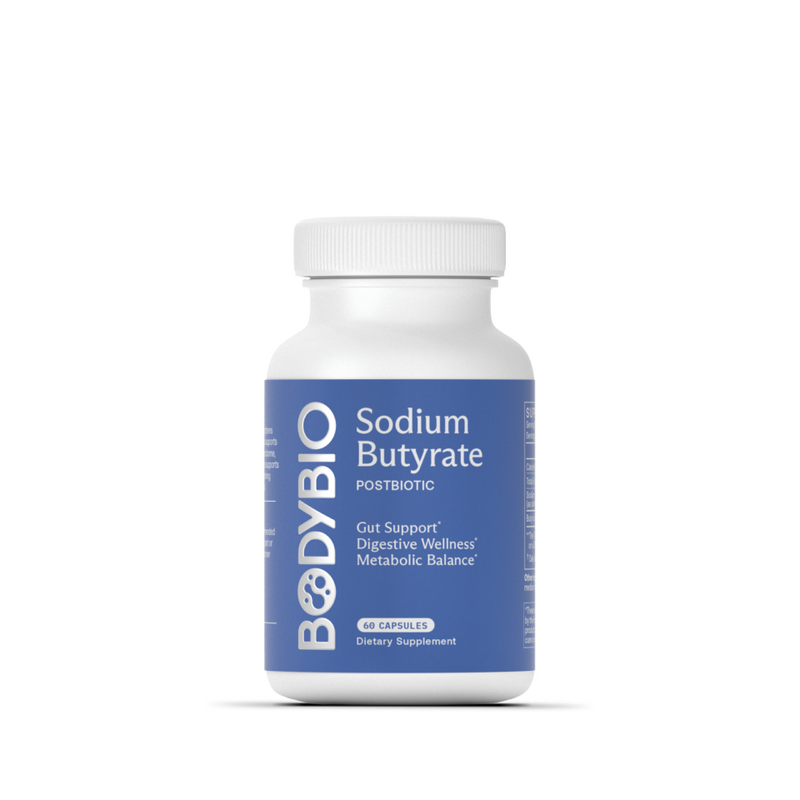9 Ways to Support Your Digestion During the Holidays
Authors:

Dr. Thomas Wnorowski
PhD, CNCC Research Director, BodyBio & Biomedical Nutritionist
Key Takeaways:
Key Points:
- The holidays are a special time of year to spend with friends, family, and your all-time favorite desserts (did someone say pie?). But this time of year is particularly difficult for those who struggle with chronic (or situational) gut symptoms.
- It’s estimated that about 2 in 3 people have daily digestive problems. While addressing them during the holidays is a priority for many people, it’s our goal for you to live the entire year symptom-free.
- Simple solutions can help you feel better during the holidays — and not skip out on your favorite family recipes. Try herbal remedies, increase your fiber intake, use digestive enzymes, and swap some of the ingredients in your pantry for healthier options.
It’s a busy time of year to have digestive issues.
While your loved ones are celebrating the return of a favorite family recipe, you’re wondering how they can possibly eat it… without the dreaded side effects.
As isolating as gut dysbiosis can feel, there’s a huge number of people who struggle with it. One study suggests around 2 in 3 people have some sort of daily digestive problem.
The holidays can make these symptoms even more difficult. With a bounty of food, drinks, social gatherings, and peer pressure, saying “no,” is not an easy choice.
No one should struggle with daily gut symptoms, regardless of the time of year. Today, we’re sharing our best supportive supplements and lifestyle changes to help turn your digestive woes around ASAP.
Table of Contents:
- Tips for Digestive Health this Holiday Season
- Regulate Your Nervous System
- Don’t Skip Breakfast
- Drink Alcohol Responsibly
- Try Digestive Enzymes
- Keep Up Your Mineral Intake
- Try Herbal Remedies
- Eat Plenty of Fiber
- Enjoy Caffeine Responsibly
- Swap Easy Ingredients
- Tired of Gut Symptoms? Try Butyrate For Holiday Bliss
Tips for Digestive Health this Holiday Season
This is the year you finally say “yes” to that dreamy chocolate pie.
Or dairy-rich mashed potatoes and gravy.
And invite everyone over for that cocktail party you’ve been talking about.
Digestive issues often feel all-consuming, but they don’t have to haunt your holidays. Here are 9 easy ways to optimize your digestion for fewer symptoms now and in the future. Pick just a handful to try, and choose the ones that resonate with you the most.
1. Regulate Your Nervous System
When faced with poor digestive health, it’s common to look for structural and biological root causes, like microbiome imbalances, low bile and stomach acid levels, poor motility, etc. But when we only look at those factors, we can miss a huge leading cause of digestive distress: dysregulation of the Enteric Nervous System (ENS).
The largest and most complex part of our nervous system, the ENS, is located in the gut. It’s made up of over 100 million cells and part of its job is to release digestive enzymes as needed, influencing everything from the digestive process to nutrient absorption.
The ENS can be greatly impacted by unprocessed trauma or chronic feelings of stress and anxiety — feelings that may be passed around the Thanksgiving dinner table right along with the cranberry sauce.
Regulating your ENS could be the difference between a relaxing holiday with friends and family while eating your favorite foods — or a holiday that’s interrupted by too many anxiety-induced bathroom trips.
These tools can help you regulate your nervous system for optimal “rest and digest”:
- Emotional Freedom Technique (EFT) tapping
- Breathing exercises
- Meditation
- Somatic exercises
- Nature walks
- Massages
- Gentle movement
- Vagus nerve stimulation
When in doubt, take a few deep breaths and remind yourself that you’re in a safe space, even when you notice tension arise at the dinner table. Feel free to excuse yourself to a quieter space for a few minutes to regulate yourself too.
2. Don’t Skip Breakfast
Skipping a full meal is not only a nightmare for your hormonal health, but it can throw your digestion out of whack. Your digestive system is heavily influenced by your circadian rhythm — the “internal clock” that tells you when to eat and sleep while controlling other things like body temperature and mood.
Instead of opting for coffee in the AM, eat a nourishing breakfast instead. Better yet, focus on eating three full meals at the same time each day. Sit down to consume your food, do some focused breathing, and relax. Creating a safe space for your body through regular meal times might be just what you need to re-regulate and calm your digestion.
3. Drink Alcohol Responsibly
In general, alcohol isn’t considered gut-friendly. It can kill off some essential bacteria in the microbiome while having adverse effects on the liver and large intestine. Since the microbiome is a key player when it comes to alcohol metabolism, some people may struggle with alcoholic drinks more than others.
Our tip (if you’re going to drink at all) is to make sure you practice responsible drinking: eat a full meal, stay hydrated with electrolytes, and know which types of alcohol your body responds positively to. Choose alcoholic drinks that you enjoy and savor them slowly. Tune into your intuition and stop drinking before any adverse effects kick in.
4. Try Digestive Enzymes
Digestive enzymes help you to break down different foods. Some of these enzymes are made in the body, while others are provided through the foods you eat. For example, raw milk has a lot of digestive enzymes that help you digest it. When milk is pasteurized, it loses many of those enzymes.
If you find that certain foods and food groups exacerbate your symptoms, it might be helpful to try taking a digestive enzyme that’s aimed at breaking down that food group. Digestive enzymes can be tricky, though — it might take some experimenting to find the right one. You may need stomach acid or bile support as well. We often recommend that people work with a naturopath or functional medicine doctor to find the best digestive enzymes to support their own bodies.
5. Keep Up with Your Mineral Intake
Minerals are often overlooked when it comes to digestive health — but they’re involved in everything from cellular function to brain health and gut wellness. Minerals like selenium are known to help reduce inflammation, especially around the gut lining.
Another mineral, magnesium, can help relieve chronic constipation while regulating the activation of digestive enzymes. And of course, you want to stay well hydrated with key electrolytes like sodium, potassium, and magnesium.
6. Try Herbal Remedies
There are several herbal remedies that can come to your aid — both as preventative measures and to calm your stomach during a flare-up. Herbs like turmeric, cinnamon, and peppermint are helpful for inflammation (good options to take if you have cramping or heartburn) while chamomile and ginger can calm your stomach during a bout of nausea.
You can take herbal remedies in supplement form, tinctures, or in tea.
7. Eat Plenty of Fiber
Fiber is well-known for its ability to combat chronic constipation (it gets things moving in the GI tract). But did you know most fiber sources are also considered prebiotics? Prebiotics act as a food source for the microbiome in your gut. It’s broken down by healthy bacteria. Keeping these important gut bugs alive is essential to maintaining optimal gut health, and to keeping your microbiome intact.
If you struggle with digesting fiber, you may need to get your body used to it. Start slow with a green smoothie in the morning or even a greens supplement. Then, move your way up to a healthy dose of fiber (fruits and veggies) at every meal. Psyllium powder can also be a helpful form of soluble fiber for many people to keep the gut moving while simultaneously absorbing toxins in the gut.
You can also try the low-FODMAP diet if fiber has been a consistent issue for you. This diet helps to remove certain foods linked to bloating and constipation, giving your gut space to heal.
8. Enjoy Caffeine Responsibly
Some of us can’t function without coffee… especially during the holidays. Coffee-free Christmas morning? No thanks.
Good news for your favorite morning beverage, coffee is linked to low mortality rates and can offer a variety of fantastic benefits to the body. It’s packed full of antioxidants!
However, a lot of people struggle with coffee consumption, because it naturally increases muscle contractions (meaning, it can speed up the digestion process and have you running to the bathroom).
If you struggle with regular diarrhea, then it’s important to limit your coffee consumption and pay attention to your symptoms and intuition. This is a safeguard against loss of minerals and nutrients, too. We recommend keeping your coffee intake to 1-2 cups in the morning. We also suggest drinking plenty of water with electrolytes alongside your morning joe.
9. Swap Easy Ingredients
One of the reasons so many of us struggle with digestive problems is due to food quality. Most of our foods are packed with preservatives and sprayed with pesticides, which can disrupt our digestion. If you struggle with bloating from gluten or pain and gas from dairy, you could try switching these foods out for higher-quality alternative options.
In Europe, there are more regulations to help protect against heavy food processing. European flour also has lower gluten content. Try sourcing your flour from there, or swap for a gluten-free flour like buckwheat. A2 dairy or raw and grass-fed dairy from a responsible local farmer could help you consume your favorite dairy-filled foods, without the symptoms.
These simple swaps and others are often a better option than eliminating an entire food group — because they still allow you to absorb essential nutrients from that food group.
Tired of Gut Symptoms? Try Butyrate for Holiday Bliss
No one wants to worry about stomach aches and gas during the holiday season — but the truth is, these symptoms shouldn’t interrupt your quality of life at any time during the year. You deserve better, and there are answers to the symptoms you face.
We were tired of the gut problems, too. That’s why we created a Butyrate supplement. Butyrate can help to nourish the microbiome, while gently eliminating bad bacteria from the gut.
Butyrate embodies the intentions behind many of these tips alongside years of science to help you combat gut symptoms naturally.
BodyBio Tip: Start taking Butyrate a few weeks before the big holidays begin. This will give your body time to adjust to the new supplement and (hopefully) allow you to enjoy your favorite holiday dishes in peace.
Fleming, M. A., 2nd, Ehsan, L., Moore, S. R., & Levin, D. E. (2020). The Enteric Nervous System and Its Emerging Role as a Therapeutic Target. Gastroenterology research and practice, 2020, 8024171. https://doi.org/10.1155/2020/8024171
Almario, C. V., Ballal, M. L., Chey, W. D., Nordstrom, C., Khanna, D., & Spiegel, B. M. R. (2018). Burden of Gastrointestinal Symptoms in the United States: Results of a Nationally Representative Survey of Over 71,000 Americans. The American journal of gastroenterology, 113(11), 1701–1710. https://doi.org/10.1038/s41395-018-0256-8
Poole, R., Kennedy, O. J., Roderick, P., Fallowfield, J. A., Hayes, P. C., & Parkes, J. (2017). Coffee consumption and health: umbrella review of meta-analyses of multiple health outcomes. BMJ (Clinical research ed.), 359, j5024. https://doi.org/10.1136/bmj.j5024
Mori, H., Tack, J., Suzuki, H. (2021). Magnesium Oxide in Constipation. Nutrients, 13(2), 421. https://doi.org/10.3390/nu13020421
Qiao, L., Yan, S., Dou, X., et al. (2022). Biogenic Selenium Nanoparticles Alleviate Intestinal Epithelial Barrier Damage through Regulating Endoplasmic Reticulum Stress-Mediated Mitophagy. Oxid Med Cell Longev, 2022, 3982613. https://doi.org/10.1155/2022/3982613




